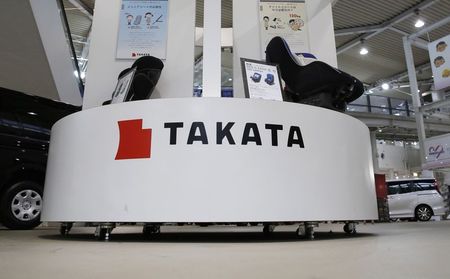By Barbara Liston, Julia Edwards and Patrick Rucker
ORLANDO/WASHINGTON (Reuters) - In recent weeks, hundreds of thousands of U.S. Toyota drivers have received a stern warning by first-class mail: Immediately drive to your dealer to replace a flawed air bag, and in the meantime don't let anyone sit on the passenger side.
Thousands of Chrysler drivers with similar air bags are unlikely to get a formal notification until December. Meanwhile, they can expect free tickets to Disney World in exchange for allowing their air bags to be tested.
Over the past six years, at least five deaths have been linked to air bags supplied by Japanese safety equipment maker Takata <7312.T> that could rupture upon deployment, spraying metal shards inside the car. More than 17 million cars have been recalled worldwide, including over 11 million in the United States.
The number, however, represents a patchwork of "safety improvement campaigns," informal "regional recalls," and formal recalls of certain models rather a consistent national action.
Some car owners are promised immediate repairs, others are told they will have to wait, while others have not been contacted at all.
Behind the confusion is carmakers' reluctance to commit to costly repairs while they still puzzle over what makes some bags explode and the U.S. safety regulators' inability to nudge them towards full-scale recalls.
Robert Lamoureux, 47, a coordinator for an events production firm in Orlando, heard about exploding airbags on the news weeks ago and confirmed on Honda's website that his 2002 Accord SE was among the models that should be brought to a dealer.
But the site told owners to wait for a notice in the mail, which only arrived at the end of October.
"They said it was an air bag issue but they didn't describe the issue. They didn't come out and say, yeah, you might lose your face."
All five deaths, four in the United States and one in Malaysia, have been in Honda cars.
Safety advocates and lawmakers say the National Highway Traffic Safety Administration (NHTSA) and carmakers, including Honda (T:7267) , Toyota (T:7203) , Chrysler (MI:FCHA) , Nissan (T:7201) , BMW (DE:BMWG) , and Ford (N:F) , were too slow and inconsistent in their response.
"There is an unequivocal need for national recalls," Senator Richard Blumenthal, a Democrat from Connecticut, told Reuters.
Regulators acknowledge they typically rely on the industry to take the initiative in recalling vehicles, but say the threat they will investigate is usually enough to prompt a recall.
"We aggressively investigate and pursue recalls to protect the American public, forcing the recall of approximately 100 million defective vehicles and equipment over the past 10 years," said NHTSA deputy administrator David Friedman.
MORE PRESSURE
Critics, however, say the agency should have pressured carmakers more and sooner instead of striking a June agreement with five manufacturers that let them voluntarily collect and analyse the potentially defective parts.
Furthermore, such investigations were initially limited to hot and humid regions, considered most problematic. Only last month that area of the continental U.S. states was expanded to beyond Florida to include Alabama, Mississippi, Georgia, Louisiana and parts of Texas along the Gulf of Mexico.
The safety agency and its allies argue that limited staffing and funding restrict how much it can investigate on its own, making it hard to formally force recalls.
According to law, the agency can only force an automaker issue a binding recall through a process that gives the company multiple opportunities to present counter-evidence and can take years.
Some experts see merits in pushing carmakers for voluntary, targeted recalls.
"By starting the recall just in the highest risk areas, all the replacement parts can be directed there first," said Professor John Paul MacDuffie, director of the Programme on Vehicle and Mobility Innovation at Wharton's Mack Institute of Innovation Management.
Yet many safety advocates argue the agency should act with greater urgency to push for a national recall to ensure consistency of carmakers' responses.
While most automakers have by now sent out letters that say "Important Safety Recall," what happens next still varies widely.
Toyota owners, for example, are told that should the new air bag not be immediately available, dealers will disable the faulty one and leave a tag on the glove compartment telling passengers not to sit in the front until a new air bag is installed.
General Motors is prepared to offer loaner cars in case of a parts shortage, said company spokesman Alan Adler.
BMW notified owners about the recall in August, but told them at the time it did not have the necessary parts. A second notice in October went to owners of affected cars nationwide - not just in the states targeted by the safety regulator - telling them that new air bags were available and should be installed immediately.
Honda only early this month turned its "safety improvement campaign" into a formal recall, but did not say how many cars were affected.
The mixed messages make owners wonder how worried they should be.
For some, like Caitlin Knowles, a 23-year-old waitress in Winter Park, Florida, it is already the second air bag recall.
Knowles brought her 2001 Honda Civic in for repairs when she was told about the air bag problems in a 2012 notice.

Now she wonders if Honda will get it right this time. "It's definitely frightening thinking about a piece of metal going through your head."
(Reporting by Barbara Liston in Orlando, and Julia Edwards and Patrick Rucker in Washington; Editing by Karey Van Hall and Tomasz Janowski)
_800x533_L_1412520412.jpg)